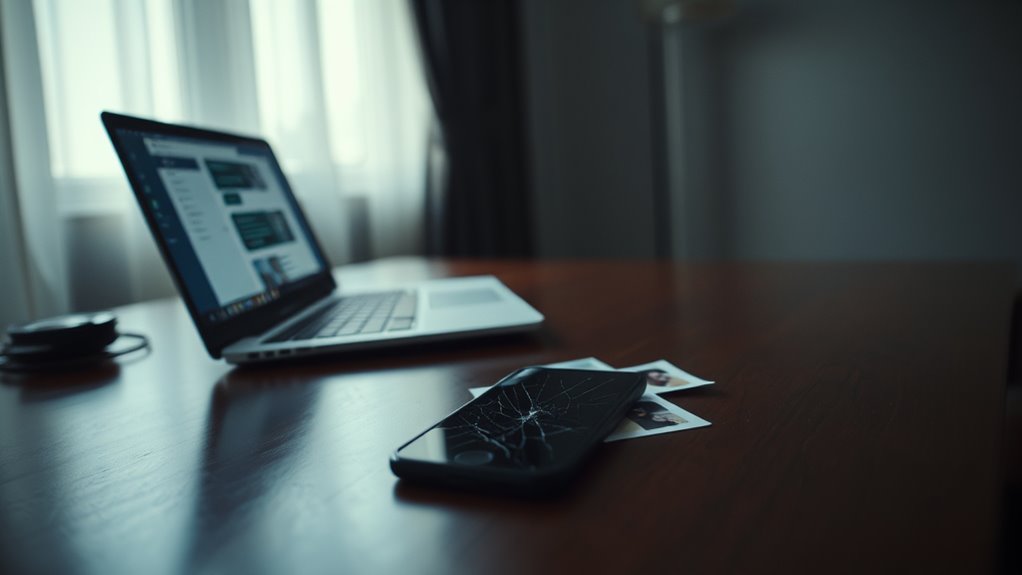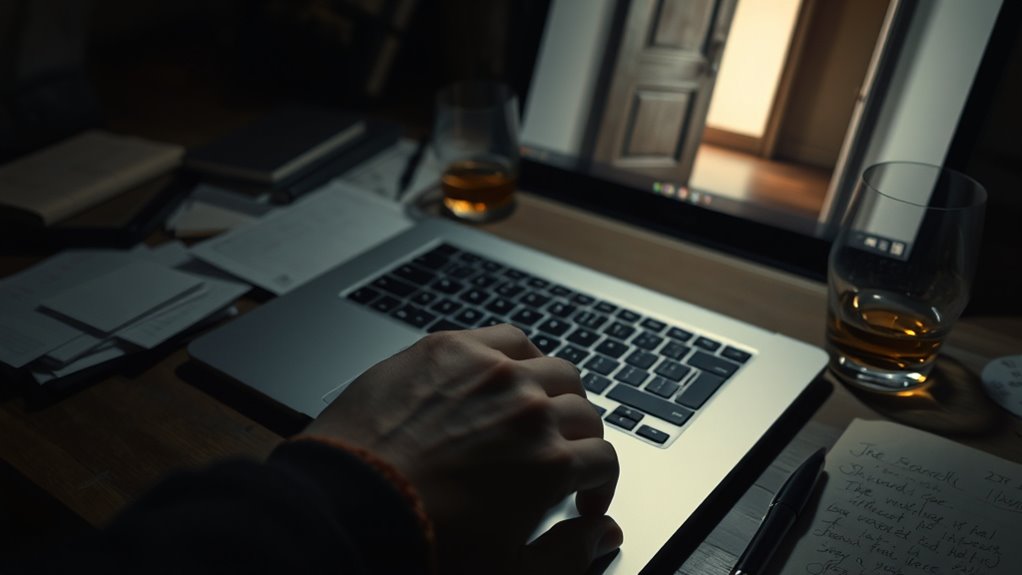When gathering evidence of adultery for divorce, you should focus on ethically obtained proof like eyewitness accounts, photos, and written admissions, but avoid illegal methods such as hacking or secret recordings, which can violate privacy laws. Courts prefer evidence collected within legal boundaries, and illegally obtained proof may be dismissed or harm your case. To guarantee your evidence is strong and admissible, it’s best to follow legal advice—discover more about what’s acceptable and what isn’t.
Key Takeaways
- Evidence must be obtained legally, such as through eyewitness accounts or consensual recordings, avoiding illegal surveillance or hacking.
- Secret recordings or hacking into private accounts often violate privacy laws and can lead to evidence being dismissed.
- Courts prefer ethically obtained evidence; coercion, entrapment, or illegal methods render evidence inadmissible.
- Corroborate evidence from multiple sources to strengthen your case and ensure it remains within legal boundaries.
- Consult legal professionals to identify permissible investigation methods and avoid infringing on personal rights.

Have you ever wondered what evidence is needed to prove adultery in a divorce case? When you’re going through a separation and suspect your spouse of infidelity, understanding what counts as valid evidence becomes essential. Courts require clear, convincing proof if you want adultery to influence your divorce settlement or custody decisions. But it’s not just about gathering any information—you need to know what’s legally acceptable and what crosses ethical lines.
Typically, evidence of adultery includes things like eyewitness testimony, photographs, or videos showing your spouse with another person in a compromising situation. Admissions made by your spouse, whether in conversations or written statements, can also serve as powerful proof. Sometimes, authorities or private investigators are hired to gather this kind of evidence, but it’s important to be aware of the boundaries. For instance, secretly recording your spouse without their knowledge might seem like a straightforward way to obtain proof, but depending on your jurisdiction, this could violate privacy laws and jeopardize your case.
Evidence such as eyewitness accounts, photos, or videos can prove adultery but must be gathered within legal boundaries.
You might be tempted to go further, such as installing hidden cameras or hacking into your spouse’s private accounts. While some of these actions might seem tempting, they often cross legal lines and can be considered illegal wiretapping or invasion of privacy. If you’re caught, not only could your evidence be thrown out, but you might also face legal repercussions. Courts tend to favor evidence that’s obtained ethically and legally, so it’s better to stick to methods that don’t infringe on personal rights.
It’s also worth noting that some states have strict rules about what kinds of evidence are admissible in court. For example, evidence obtained through entrapment, coercion, or illegal surveillance may be dismissed. Furthermore, courts often look for corroboration—meaning you can’t rely solely on one piece of suspicious evidence but need multiple sources to substantiate your claim. This helps prevent false accusations and ensures the evidence is credible.
In the end, collecting evidence ethically is fundamental not just to strengthen your case but also to avoid legal pitfalls. While it’s understandable to want clarity and proof, doing so within the bounds of the law preserves your integrity and ensures any evidence you gather can be used effectively. Trust your instincts, but also consult with a legal professional to guide you through what’s permissible. This way, you’ll be better equipped to present a compelling, lawful case that accurately reflects the situation.
Frequently Asked Questions
Can Social Media Activity Be Legally Used as Evidence?
Yes, social media activity can be legally used as evidence in court, but you need to guarantee it’s obtained properly. You might need a subpoena or court order to access private messages or restricted content. Be cautious about privacy laws and ethical considerations—avoid hacking or unauthorized access. Using publicly available posts is generally acceptable, but always consult a legal professional to verify that your evidence complies with relevant rules.
Is Secretly Recording Someone’s Conversations Always Legal?
Think of secretly recording someone’s conversations like sneaking a peek at a gift before it’s wrapped—sometimes it feels justified, but it’s often illegal. Generally, in most states, recording someone without their consent violates wiretapping laws. For example, in California, all parties must agree to be recorded. If caught, you could face serious legal consequences. Always check your local laws before recording, as legality isn’t universal.
Are There Privacy Laws Protecting Individuals From Surveillance?
Yes, there are privacy laws protecting individuals from surveillance. You can’t legally record someone’s conversations without their consent in many states, especially if you’re eavesdropping or intercepting communications secretly. Laws vary depending on your location, so you should always check local regulations before recording. Violating these laws can lead to legal consequences, including criminal charges and civil lawsuits. Respect others’ privacy rights to avoid legal trouble and ethical issues.
How Can I Verify the Authenticity of Digital Evidence?
Imagine digital evidence as a rare gemstone—you need to guarantee it’s genuine before trusting its sparkle. To verify authenticity, check the chain of custody, ensuring each step is documented. Use trusted forensic tools to confirm files haven’t been altered. Cross-reference data with original sources, and consult experts if needed. Just like examining a gemstone’s clarity, scrutinize digital clues carefully to ensure they’re real and reliable.
What Ethical Considerations Should I Keep in Mind During Investigation?
You should prioritize honesty, respect privacy, and follow legal standards during your investigation. Avoid intrusive methods like hacking or unauthorized surveillance, and guarantee you have proper consent when necessary. Document your actions thoroughly to maintain transparency and integrity. Remember, ethical conduct not only protects you legally but also preserves the credibility of your findings, so always act responsibly and within the boundaries of law and moral guidelines.
Conclusion
Now that you understand what counts as ethical evidence, think carefully before gathering any more. The line between right and wrong can be blurry, and crossing it might backfire. Are you truly prepared for what could come to light? Sometimes, what’s uncovered can change everything—perhaps even your future. Stay cautious, stay ethical, and remember: in the game of love and law, the truth isn’t always what you expect.









